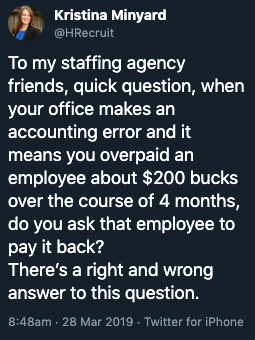Most boards of companies are made up of current company executives and/or executives from other companies are former executives from other companies. Almost never will you find a “regular Joe” on the board of directors.
Last week, a worker’s rights organization, United for Respect, presented to Congress and then to Walmart’s board the idea of adding hourly Walmart workers to its board, with full voting privileges. From the New Yorker:
“The practice of constantly cutting costs and squeezing workers often stems from the short-term-profit-oriented mind-set that has come to dominate corporate America over recent decades, in which moves to boost a company’s stock price are given priority over longer-term investments in infrastructure and employees. Murray believes that, if there had been a meaningful number of people with a stake in Walmart’s longer-term health—such as store associates—involved in the business decisions, some of these changes wouldn’t have happened, and the company would be better off. This led Murray, with the help of a worker’s-rights organization called United for Respect, to join in drafting a resolution that she plans to present to Congress on Tuesday—and, later, at Walmart’s annual shareholders’ meeting—urging the company to place a significant number of hourly retail employees on its board of directors so that they might have input on major corporate decisions.”
I love the idea. The only way it works is if the hourly employees who are on the board, have full voting rights as other board members, and they are not compensated in a way that makes them vote differently than they would as a normally compensated hourly worker. Basically, you couldn’t allow management to game the system by making it financially rewarding to those hourly employees that incentives them to make decisions in ways they normally wouldn’t.
So, would it be better for organizations to have hourly employees on their board? That’s the real question! More from the article:
“Because workers have so rarely been invited to participate in board-level decisions at companies in the U.S., there are few domestic examples to look to for a sense of how it would play out. In Germany and a handful of other European countries, however, having worker representation on boards is required. Baldwin’s office found research that showed that companies with worker representation invest twice as much in their businesses as those without; wages are higher, and profits are distributed more evenly. These firms also performed better. None of this is surprising. Low-level employees are deeply invested in a company’s long-term success, because their families depend on it in ways that top executives waiting for a bonus may not.”
I’m definitely one of those people who believe we have an issue with executive compensation. Sure you see examples that are grotesque, but for the most part, executive compensation is market driven, and if organizations want to find effective leadership that has the ability to lead on a giant scale, it costs money.
I think what we are missing is the re-investment piece. Most boards and executives are concerned with financial performance, but in the short-term, not long. Quarter to quarter earnings drives short-term decision making that many times doesn’t include re-investment into the business to ensure long-term, steady success.
The market doesn’t reward steady success, so boards make decisions that are many times counterintuitive to long term success. Hourly employees, in turn, would tend to make better long-term business decisions because this business success long-term has a much bigger impact on their life, versus short-term business gains.
I’m not sure I want to see this regulated, I tend to believe the market will show companies how to run. That being said, in the past few decades the market has led many strong companies down the wrong path.
What do you think? How would you feel about having hourly employees on your board of directors?



